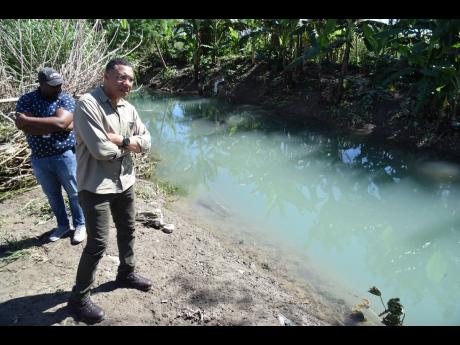Fallout for farmers
Heavy rains batter St Thomas crops, resulting in millions in losses as PM promises to help
Michael Edwards, a 42-year-old farmer from Golden Grove in St Thomas, had invested more than $1.5 million in his two acres of sweet corn crop and was due to harvest one acre shortly. But the heavy rains last week flooded his crops and washed his anticipation away.
Edwards told The Gleaner that he was used to suffering losses, however, this most recent one, which he estimates to be about $4 million, has left him very uncertain about the future.
“The sweet corn was my last drop in the bucket, so I don’t know what’s going to happen after this,” he said.
Edwards is one of many farmers in the area, which is home to the Plantain Garden and Golden Grove rivers, which often overflow during heavy rains, who suffered millions in losses from the flood.
“I know it’s flood prone, but guess what. The last time this happened was four years ago. A lot can be done in four years. As with any business, there is always a risk factor, and flooding is the risk factor as it relates to Golden Grove, (but the lands are) very, very fertile,” he said.
For Garfield Espeut, his 15 acres of land, where he plants tomatoes, peppers, and pumpkins, were almost completely submerged in flood waters, resulting in him losing approximately $17 million.
The 48-year-old farmer said he has been farming in the area for two years, and last week’s flooding was the worst he had seen.
“Mi and my partner, we spend over a million dollars on seedings alone - not leasing the land, not ploughing the land, not paying workers, no chemical nuh in deh, no drip system nuh in deh – just seedings alone, and all of that dump up now brown. Pepper just start bare, and we lost all of it,” he vented.
It was a similar situation for farmer of 30 years Livert Johnson, whose 33-acre farm, where he plants pumpkin, plantain, banana, melon and sweet potato, among other crops, flooded when the Plantain Garden river overflowed its banks.
He, too, was attracted to the arable lands in Golden Grove and has been leasing his farm for the last four years. But now the floods have left him with over $1 million in losses. “Mi a look to barrow back a loan and try to come on mi feet again and get back together,” he said.
Johnson believes more consistent drain cleaning can help with the flooding and minimise the impact on his land.
“If we get the drain dem clean more we would have a better result. When di rain fall, it wouldn’t be in wi plant so much. It wudda run off quickly,” he said.
Meanwhile, Prime Minister Andrew Holness, who was on a tour of the parish to assess the damage caused by the heavy rains, noted that there are many rivers in the parish, and farmers and residents alike could benefit from investment in river training.
“There needs to be greater investment in river training. So the rivers are overflowing the banks as you would know them for 10 or 15 years, and they are changing their course and destroying agricultural lands and threatening houses,” he said.
Because the rivers are not well trained and you don’t have well-established embankments, you have many tributaries coming off those rivers,” he added.
“While it is beneficial and helps to irrigate and make lands arable, infrastructure needs to be put in place to manage it, particularly where these tributaries are crisscrossing lands and roadways.”
The prime minister, in the meantime, committed to assisting the farmers.
“We will try to assist as much as possible. The challenge is the process of assistance might not sync with the cycle for farming, and these farmers need to go again, and the time it takes for the allocation to the approval, to the disbursement might not sync with the time they need to get back in the field,” he said.


